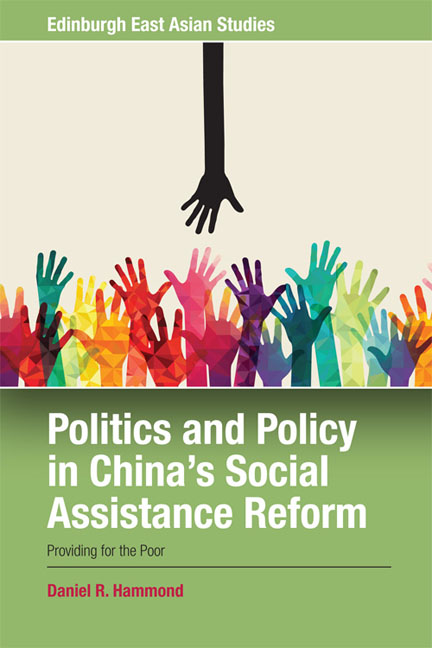Book contents
- Frontmatter
- Contents
- Acknowledgements
- Note on Chinese and Translations
- Glossary of Terms and Abbreviations
- Introduction
- 1 Historical Background to Dibao and the Question of Poverty in China
- 2 Urban Dibao: Emergence and Transition to National Policy, 1992–1999
- 3 Urban Dibao: The Resolution of Unwanted and Unintended Outcomes, 1999–2003
- 4 Rural Dibao: The Countryside and Fragmentation
- 5 Institutionalisation? Achieving Policy in a Fragmented State
- Conclusion
- Appendix: Interview List
- Bibliography
- Index
5 - Institutionalisation? Achieving Policy in a Fragmented State
Published online by Cambridge University Press: 18 December 2019
- Frontmatter
- Contents
- Acknowledgements
- Note on Chinese and Translations
- Glossary of Terms and Abbreviations
- Introduction
- 1 Historical Background to Dibao and the Question of Poverty in China
- 2 Urban Dibao: Emergence and Transition to National Policy, 1992–1999
- 3 Urban Dibao: The Resolution of Unwanted and Unintended Outcomes, 1999–2003
- 4 Rural Dibao: The Countryside and Fragmentation
- 5 Institutionalisation? Achieving Policy in a Fragmented State
- Conclusion
- Appendix: Interview List
- Bibliography
- Index
Summary
Introduction
The previous three chapters addressed issues which affected the urban and rural dibao systems during the initial emergence, development and implementation of the programmes. This highlighted the significant impact that China's fragmented policy-making system had on dibao, shaping not just how it emerged but also how it subsequently developed, the context of national implementation, and subsequent adaptations and expansion. The chapters also demonstrated that the significance of the actors who had an interest in dibao and where they were in the state hierarchy was significant in determining outcomes, especially with regard to the utilisation of resources (authority, financial, personnel or information). The preceding discussion also highlighted the various challenges that the dibao system has experienced during its implementation, including local government resistance to implementation and exclusion of those entitled, for example. This chapter will address how these issues might ultimately be addressed by discussing the question of whether or not both the urban and rural dibao systems have been institutionalised since the mid-2000s, and the implications of the answer. Overall it will argue that dibao has not been institutionalised and that the process of institutionalising was cut short in the late 2000s. This is primarily due to the purpose of the policy and the changing nature of China's development, but it is also indicative of certain aspects of China's FA and the impact this has on the policy-making process. Looking to the future this has implications for the policy long term in that it leaves the current system in a precarious state, but it also allows the Chinese state to respond to the changing nature of China's socio-economic context as well as more global developmental trends.
To this end the chapter is structured as follows. First, the concept of institutionalisation will be set out and discussed. This section will be broadly based on Fewsmith's study on the sustainability of experiments and reforms to local accountability in China, and Leung and Xiao's argument that social assistance in China has been institutionalised (Fewsmith 2013; Leung and Xiao 2016). The definition of institutionalisation set up in this section will go on to inform the rest of the discussion in the chapter.
- Type
- Chapter
- Information
- Politics and Policy in China's Social Assistance ReformProviding for the Poor?, pp. 106 - 131Publisher: Edinburgh University PressPrint publication year: 2018



